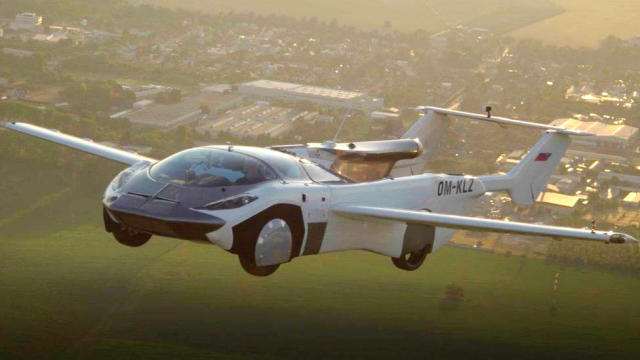
The Slovak Transport Authority has granted a certificate of airworthiness to a flying car capable of reaching speeds of over 100mph (160kph) and heights of over 8,000ft (2,500m).
AirCar, a hybrid car-aircraft, powers by a BMW engine and runs on regular gasoline.
The transition from car to plane takes two minutes and fifteen seconds.
According to the business, the certification came after 70 hours of flight testing and more than 200 take-offs and landings.
Prof Stefan Klein, the AirCar’s developer, stated, “AirCar certification opens the door for mass production of very efficient flying cars.”
“It is official and the final confirmation of our ability to change mid-distance travel forever.”
Are flying cars the future?

In June, the flying car also completed a 35-minute flight between Nitra and Bratislava, Slovakia’s international airports.
According to BBC News, the company plans to “fly to London from Paris in the near future.”
Dr. Steve Wright, a senior research fellow in avionics and aircraft systems at the University of the West of England, described the news as “a good step down the road” for the company, adding that he was “cautiously optimistic that I am going to see a few AirCars one day – but I think there is still a way to go”.
Other businesses are working on flying cars that one can also drive on the road.
The PAL-V Liberty, a three-wheeled gyrocopter that flies like a helicopter, is road legal in Europe and pursuing European Union Aviation Safety Agency certification.
Dr. Wright, on the other hand, is skeptical about the mass appeal of flying cars. (www.newportworldresorts.com)
“Are flying cars the future? Yes… and no,” he said.
“The personal-transport revolution is definitely coming but not really looking like this.
“From a transport point of view, it has a niche – although, a very interesting niche.”
Air taxis

The AirCar is a small plane that takes off and lands like a regular plane and requires a pilot’s license to operate.
Unpiloted air taxi services with autonomous flight and vertical landing and take-off are being developed by several firms.
They are promoted as a convenient and flexible mode of transportation, and some are also garnering major investment.
Boeing also announced an additional $450 million (£334 million) investment in Wisk, the California-based autonomous-air-taxi firm it owns with Kitty Hawk, a company founded by Google co-founder Larry Page.


